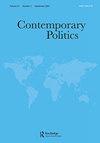Power struggle on subjectivity and foreign policy: a post-structuralist analysis of JDP’s policies towards the United States (2002–2016)
IF 2
3区 社会学
Q1 POLITICAL SCIENCE
引用次数: 0
Abstract
ABSTRACTThis article analyses Turkish foreign policy towards the United States (US) during the Justice and Development Party (JDP) era by using a post-structuralist approach. Post-structuralism posits that foreign policy is a political practice reflecting domestic power struggles. Moreover, subjectivities and foreign policy practices are neither universal, objective, nor predetermined, since they are co-constitutive. From this theoretical perspective, the article explores the JDP’s 'foreign policy' discourse on US-Turkish relations, highlighting discursive practices in legitimising specific subjectivities, such as 'conservative' and 'Muslim' ones, as 'inherent' origins of foreign policy conduct. In two phases, 2002–2009 and 2009–2016, it analyses how changes in JDP’s foreign policy preferences towards the US function to legitimise or marginalise particular subjectivities in its power struggle vis-à-vis 'Kemalist' state elites. Ultimately, the article concludes that the JDP’s discourse exhibits a continuity in hegemonising the 'Islamic' subjectivity ascribed to the Turkish population, despite changes in foreign policy decisions.KEYWORDS: Turkish foreign policyJDPpost-structuralismTurkey-US relations Disclosure statementNo potential conflict of interest was reported by the author(s).Notes1 See the discussion held in the TGNA, TBMM Tutanak Dergisi, Period. 22, Vol. 6, 11 March 2003, 456–462. See also, (Robins, Citation2003).2 Details can be seen in ‘The Alliance of Civilizations Initiative’, Ministry of Foreign Affairs, Republic of Türkiye, https://www.mfa.gov.tr/the-alliance-of-civilizations-initiative.en.mfa.Additional informationNotes on contributorsTuncer BeyribeyTuncer Beyribey serves as a guest lecturer at Istanbul Arel University. Prior to this role, he held the position of a research assistant at Marmara University, where he successfully completed his doctoral studies. His academic pursuits primarily encompass the domains of terrorism discourse, political violence in Turkey, and Turkish foreign policy.Nur Çetinoğlu HarunoğluNur Çetinoğlu Harunoğlu is assistant professor of International Relations at Marmara University, Istanbul. Her research interests cover Turkish foreign policy, US foreign policy, Turkey–US relations, and Gulf region. She is the co-author of Turkey between the United States and Russia: Surging on the Edge (with Aysegul Sever and Emre Ersen, Maryland: Lexington Books, 2021) and Soguk Savas Sonrasinda Turkiye-ABD Iliskilerinde Orta Dogu ve Lider Diplomasisi (The Middle East and Leadership Diplomacy in Turkey-US Relations after the Cold War, with Ali Faik Demir, Istanbul, Yeditepe Publications, 2023).主体性与外交政策的权力斗争:民主党对美政策的后结构主义分析(2002-2016)
摘要本文运用后结构主义理论分析了正义与发展党执政时期土耳其对美外交政策。后结构主义认为,外交政策是一种反映国内权力斗争的政治实践。此外,主观性和外交政策实践既不是普遍的、客观的,也不是预先确定的,因为它们是共同构成的。从这一理论角度出发,本文探讨了民主党关于美土关系的“外交政策”话语,强调了将特定主体性合法化的话语实践,如“保守”和“穆斯林”,作为外交政策行为的“固有”起源。本文分2002-2009年和2009-2016年两个阶段,分析了日本民主党对美外交政策偏好的变化如何使其与-à-vis“凯末尔主义”国家精英的权力斗争中的特定主体性合法化或边缘化。最后,文章的结论是,尽管外交政策的决定发生了变化,但民主党的话语在霸权土耳其人口的“伊斯兰”主体性方面表现出了连续性。关键词:土耳其外交政策、后结构主义、土美关系披露声明作者未报告潜在利益冲突。注1见TGNA上的讨论,TBMM Tutanak Dergisi,第22期,第6卷,2003年3月11日,456-462页。参见(罗宾斯,Citation2003)详情请见基耶共和国外交部“文明联盟倡议”,网址:https://www.mfa.gov.tr/the-alliance-of-civilizations-initiative.en.mfa.Additional信息关于投稿人的说明。滕贝格·贝里贝是伊斯坦布尔阿勒尔大学的客座讲师。在此之前,他曾在马尔马拉大学担任研究助理,并在那里成功完成了博士学位。他的学术研究领域主要包括恐怖主义话语、土耳其政治暴力和土耳其外交政策。努尔Çetinoğlu HarunoğluNur Çetinoğlu Harunoğlu是伊斯坦布尔马尔马拉大学国际关系学助理教授。她的研究兴趣包括土耳其外交政策、美国外交政策、土美关系和海湾地区。她是《美国和俄罗斯之间的土耳其:在边缘上涌动》(与Aysegul Sever和Emre Ersen合著,马里兰州:Lexington Books, 2021年)和Soguk Savas Sonrasinda Turkiye-ABD Iliskilerinde Orta Dogu ve Lider Diplomasisi(冷战后土耳其与美国关系中的中东和领导外交,与Ali Faik Demir合著,伊斯坦布尔,Yeditepe Publications, 2023年)的合著者。
本文章由计算机程序翻译,如有差异,请以英文原文为准。
求助全文
约1分钟内获得全文
求助全文

 求助内容:
求助内容: 应助结果提醒方式:
应助结果提醒方式:


